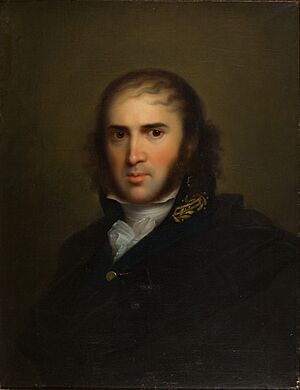Johann Karl Simon Morgenstern facts for kids
Johann Karl Simon Morgenstern was an important German scholar who lived a long time ago. He was a philologist, which means he studied languages and old texts. He also became the very first director of the library at the Imperial University of Dorpat in what is now Estonia. Morgenstern is famous for creating the term Bildungsroman, which describes a special kind of novel.
Contents
A Scholar's Life: Johann Morgenstern's Journey
Johann Karl Simon Morgenstern was born in Magdeburg, a city in Germany, in 1770. When he was a young man, he went to the University of Halle. There, he studied philosophy with a teacher named Johann August Eberhard. He also studied philology, the study of language and literature, with Friedrich August Wolf.
Moving to Dorpat and New Studies
In 1802, Morgenstern moved to Dorpat. This city was in Livonia, which was part of the Russian Empire at the time. Today, Dorpat is known as Tartu and is in Estonia. He spent the rest of his life there.
At the newly reopened University of Dorpat, Morgenstern became a professor. He taught many subjects, including rhetoric (the art of speaking and writing well), classical philology (the study of ancient Greek and Roman languages), aesthetics (the study of beauty and art), and the history of art and literature. He also took on the important role of being the first director of the university's library.
Changing Focus and Coining a Term
Once he was in Dorpat, Morgenstern's work changed. He stopped focusing so much on his studies of the ancient Greek philosopher Plato. Instead, he started writing more about literature, art, language, and philosophy.
During this time, he created the term "Bildungsroman". This word describes a type of novel where the main character grows and develops from childhood into adulthood. They learn about themselves and the world around them, often through many experiences.
Later Years and a Special Gift
Even after he retired in 1834, Morgenstern continued to live in Dorpat. He loved books and learning. When he passed away in 1852, he left his huge personal library to the university. This library had about 12,000 books! It also included many old manuscripts and even some papers that belonged to the famous philosopher Immanuel Kant.
A few years after his death, a special medal was made to honor him. This medal was created by Ferdinand Helfricht in Gotha, Germany. Seven of these medals were made from silver, and 200 were made from bronze.
Gallery
-
A memorial for Morgenstern on Toome Hill in Tartu (Dorpat).
 | Isaac Myers |
 | D. Hamilton Jackson |
 | A. Philip Randolph |





